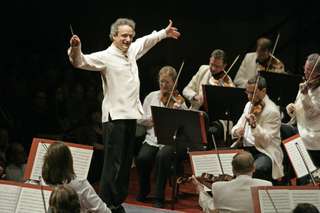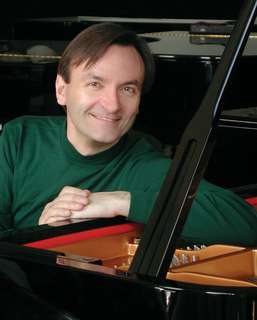|
Back
The Mozart Revelations New York
Avery Fisher Hall, Lincoln Center
08/20/2010 - & August 21, 2010
Wolfgang Amadeus Mozart: Piano Concerto No. 21 in C major (K. 467) – Davidde penitente, K. 469
Stephen Hough (Piano), Carolyn Sampson (Soprano), Sasha Cooke (Mezzo-soprano), Steve Davislim (Tenor)
Concert Chorale of New York, James Bagwell (Director), Mostly Mozart Festival Orchestra, Louis Langrée (Conductor)

L. Langrée (© Richard Termine)
Two surprises greeted concertgoers last night. First was that the final Mostly Mozart concert consisted of music by……by Mozart! No choruses from the Caucasus, no Ligeti luminescences, no Xenakis ex-zitement. Nothing wrong with any of these, but it did seem strange to actually hear Mozart again.
The second surprise was Mozart’s oratorio, Davidde penitente, totally new to this listener, and probably the majority in Avery Fisher Hall. While a good deal was familiar (music from the unfinished Mass he had written for his wife), some of the choruses were among the most original which Mozart, in his last years, could create.
Back to the Mostly Mozart Orchestra. Accustomed this past week to the quasar-sharp legerdemain of the International Contemporary Ensemble, one heard the first notes of Mozart’s C Major Concerto with authority. Conductor Louis Langrée knows how to bring his ensemble–less than half ot the New York Phil–to ringing tones, the most lucent string playing, and, in the majestic first movement of the Concerto some joyous drum-and-brass blazoning.

S. Hough (© Christian Steiner)
Like Mahler’s Adagietto, the Andante of the work has taken on an unfortunate autonomy. It is still, though, the model of grace, balance and classical pathos, as well as being a central movement in both sense of the word. Mr. Hough played it with sensible good intentions, but such sensibility never plumbed the depths. Mozart’s audacity in dissonant suspensions, its buildup from tranquility to despair was played steadily, reliably, but hardly movingly.
Mr. Hough, though, is a faultless technician, and one felt this virtuosity in the first movement. Such a model of fine pianism was sometimes without feeling. During those moments where Mozart suddenly changes tack–the abrupt change to a minor key for the development–Mr. Hough simply jumped through the hoop rather than waiting for the effect.
Scampering through the finale is excusable, though he fractionally gained on the orchestra at times, and his cadenza wasn’t quite the right fit for the majestic piece as a whole.
The oratorio, though, made up for a relatively banal piano concerto. In fact, the choruses of Davidde penitente are as glorious, muscular and unlike Mozart as anything I’ve ever heard.
For the finale, it was so obvious that he had been studying Bach (when he found the pages, he didn’t sleep for two days, just reading them for the first time), and that he was editing Haendel’s Messiah. There was nothing of the elegant Classicist here. It was the opening of a great battle, with a fugue that defies description. Mozart took a rare form, and made it live the way Handel would have loved.
The Adagio chorus has Italian words all about punishment, and this dark, fervent, agonizing piece was given correctly a massive performance.
The opening was a memory from the unfinished Mass for his wife, since this–and many sections of the rest–were brought in from that work.
The choruses did stand out here, since Mozart was so obviously in a Haendelian mood, since he had already written them once (for the other Mass), and the always reliable Concert Chorale of New York did the honors.
(One would hope, in fact, that Davidde penitente replace the unfinished C Minor Mass, since is is obviously complete.)
The three soloists were more than adequate. Soprano Carolyn Sampson was a bit strident in the opening, but her bel canto aria, marked in my score with the rare direction Allegro aperto), and the duet with Sasha Cooke–the latter easily taking on her highest range–were fine. Steve Davislim had, in his single pastoral aria, with a woodwind quintet, a splendid unruffled tenor.
But the choruses of this made the Mostly Mozart finale more than grand. Louis Langrée conducted with all the fervor necessary, the Concert Chorale provided the voices, and Mozart–as always–provided the musical revelations.
Harry Rolnick
|